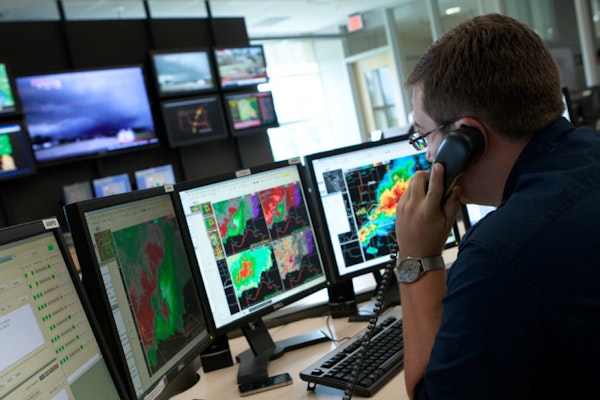
Scattered Spider Cyber Threat Targets US Airline and Transport Industries
The FBI issues urgent warnings as the Scattered Spider cybercriminal group pivots its attacks from UK retailers to airlines and transport organizations across the US.
June 30
Education & Training
Liability
Risk Management
Technology

Loss of Military Satellite Data May Affect Hurricane Forecast Accuracy
Critical satellite data used for predicting rapid hurricane intensification will end June 30, potentially complicating forecasts during peak hurricane season.
June 30
Catastrophe
Property
Risk Management
Technology

Cyber Risk and Technology Trends Reshaping Business Resilience in 2025
Executives’ cyber risk awareness is climbing, yet a misplaced confidence in cyber resilience persists amid escalating threats and geopolitical instability.
June 30
Legislation & Regulation
Liability
Risk Management
Technology
California

Modernizing Insurance Claims Payment Infrastructure for Greater Efficiency and Trust
Research reveals that fragmented back-end financial systems hinder timely claims payments and increase risks, highlighting the need for integrated, real-time solutions.
June 30
Education & Training
Insurance Industry
Risk Management
Technology

Federal Judge Rules Anthropic’s Book Use Fair but Piracy Still Faces Penalty
A San Francisco federal judge declares Anthropic’s AI book training fair use, yet rules storing millions of pirated copies illegal, setting stage for potential damages.
June 25
Legislation & Regulation
Litigation
Risk Management
Technology
California

AI and Value-Based Care Are Transforming Workers’ Comp Claims Management
Artificial intelligence and outcome-focused care models are streamlining workers’ compensation by improving triage, reducing costs, and prioritizing long-term recovery outcomes.
June 24
Life & Health
Risk Management
Technology
Workers' Compensation
Ohio

Insurance Leaders Highlight Litigation and AI Trends at JIF 2025 Forum
Insurance executives discuss navigating escalating litigation risks and embracing generative AI to enhance efficiency and rebuild consumer trust amid evolving uncertainties.
June 24
Insurance Industry
Legislation & Regulation
Litigation
Technology
Florida

Frustrating Digital Claims Processes Keep 20% of Consumers from Filing
A recent Insurity survey highlights the importance of blending digital convenience with human support to enhance policyholder satisfaction and claims experiences.
June 24
Auto
Insurance Industry
Property
Technology

Revolutionizing Catastrophe Modeling with AI for Insurers
Insurers can modernize CAT modeling by integrating AI-driven data capture, cleansing, enrichment, and analysis to deliver dynamic, real-time risk assessments that enhance underwriting and portfolio decisions.
June 19
Catastrophe
Insurance Industry
Risk Management
Technology

Insurance Industry Pushes Back on Federal AI Regulation Moratorium
The PIA, NAIC, AITC and NCOIL all warn that a proposed 10-year federal ban on state AI regulation would undermine consumer protections, stifle innovation and disrupt insurance markets.
June 19
Insurance Industry
Legislation & Regulation
Risk Management
Technology

Unlocking Underwriting Efficiency with Agentic AI Solutions
Agentic AI empowers carriers to tackle operational underwriting bottlenecks—streamlining risk analysis, fraud detection, and workflow automation to boost capacity in today’s talent-scarce market.
June 19
Insurance Industry
Risk Management
Technology
Underwriting

Washington Post Cyberattack Targets Journalists Covering China and National Security
A targeted cyberattack compromised Microsoft accounts of Washington Post reporters covering China and national security, prompting a sweeping internal investigation.
June 16
Insurance Industry
Litigation
Risk Management
Technology

States Move to Halt 23andMe Sale Over Privacy Concerns About Genetic Data
Twenty-seven states and D.C. filed suit to block the sale of genetic and medical data in 23andMe’s bankruptcy, citing lack of informed customer consent.
June 12
Legislation & Regulation
Life & Health
Risk Management
Technology

Utility and AI Apps Dominate as Distracted Driving Habits Shift in 2024
CMT’s 2024 report reveals a shift in distracted driving habits, with fewer drivers using phones but a surge in utility and AI app usage behind the wheel.
June 12
Auto
Insurance Industry
Risk Management
Technology
Massachusetts

Google Partners with National Hurricane Center for AI-powered Tropical Cyclone Forecasts
Google is working with the National Hurricane Center to evaluate a new AI model that could enhance tropical storm predictions up to 15 days in advance.
June 12
Catastrophe
Legislation & Regulation
Risk Management
Technology





